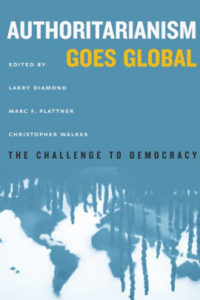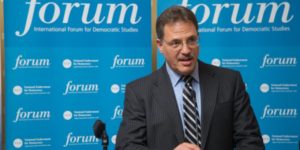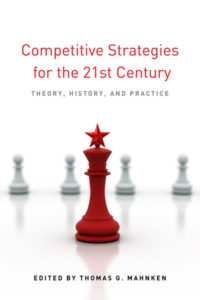 Authoritarian states have taken a “whole-of-government” approach to weaponizing previously benign activities like diplomacy, media, investment flows, and civil society activity, says a new report. But their activities betray a fundamental “birth defect” – their lack of legitimacy.
Authoritarian states have taken a “whole-of-government” approach to weaponizing previously benign activities like diplomacy, media, investment flows, and civil society activity, says a new report. But their activities betray a fundamental “birth defect” – their lack of legitimacy.
The Chinese Communist Party’s targeting of NGOs, for instance, is telling because it reveals a deep insecurity within the regime, Bloomberg’s Eli Lake writes. Since the 1990s, desperate leaders have made scapegoats of organizations such as Freedom House and the National Endowment for Democracy, almost always a response to internal challenges to an autocrat’s legitimacy. The tactic has two purposes: to make U.S. programs that support democratic opposition toxic; and to make popular unrest appear to be the result of U.S. meddling.
Like all contemporary nondemocratic systems, the Chinese system suffers from a birth defect that it cannot cure: the fact that an alternative form of government is by common consent more legitimate, Columbia University’s Andrew Nathan wrote for the Journal of Democracy.
Western nations must wage their own political warfare campaigns “to preserve peace and avoid war” and stop rival authoritarian states from undermining democracy, Australian parliamentarian Andrew Hastie writes in an essay for a report published by the London and German think tanks the Henry Jackson Society and Konrad Adenauer Stiftung.
 The prevailing strategic culture – drawing on the likes of Prussian military theorist, Carl von Clausewitz – has not prepared the democratic West to understand the autocratic threats, diminished our peacetime statecraft, fostering a culture of passivity and wishful thinking as modern great power competition begins to reshape the world order, argues Hastie, the chair of the Australian Parliament’s Joint Intelligence and Security Committee.
The prevailing strategic culture – drawing on the likes of Prussian military theorist, Carl von Clausewitz – has not prepared the democratic West to understand the autocratic threats, diminished our peacetime statecraft, fostering a culture of passivity and wishful thinking as modern great power competition begins to reshape the world order, argues Hastie, the chair of the Australian Parliament’s Joint Intelligence and Security Committee.
Authoritarian states have weaponized previously benign activities like diplomacy, media, investment flows, infrastructure development, and foreign asset purchases. University campuses have become the modern battlegrounds of covert influence and interference. These activities complement more aggressive forms of subversive warfare such as intellectual property theft, forced technology transfer, cyber-attacks, and espionage, he writes in an essay for The Art of Deceit: How China and Russia Use Sharp Power to Subvert the West:
The democratic West has lacked the intellectual framework both to perceive and to respond to these subversive tactics. We have not inhabited the revolutionary mindset or worldview, limiting our capacity to grasp the strategy of our authoritarian adversaries as they probe the boundaries of acceptable peacetime behavior. Our passivity is dangerous, so that we risk escalating tensions if we attempt to recover ground lost by subversive means.
 The battle is now well along to determine which set of values—democratic or authoritarian—will shape the emerging world order, Stanford University’s Larry Diamond (right) tweeted. And China’s alarming inroads at the UN should worry us all. We need a grand strategy to counter PRC sharp power.
The battle is now well along to determine which set of values—democratic or authoritarian—will shape the emerging world order, Stanford University’s Larry Diamond (right) tweeted. And China’s alarming inroads at the UN should worry us all. We need a grand strategy to counter PRC sharp power.
The moral necessity of avoiding conflict is clear enough. But the acquisition of such expertise also multiplies the statecraft available to us to protect our geopolitical interests. Political leaders will have more flexibility and policy options at their fingertips. The question is: What needs to be done? Hastie adds:
- First, we need to recognize, understand, and articulate the challenge facing the West. This requires political leadership, since the great power competition between authoritarian and democratic states is ultimately a contest of ideas. National leaders must affirm and articulate the values that define Western democracies, especially as we seek to build a coalition of like-minded partners to resist authoritarian political warfare. Over the last century, the West has built a powerful set of alliances and partnerships, and these now need to be mobilized….
- Second, we must enlist the full weight of democratic institutions in this effort, including the giving of major speeches, initiating parliamentary inquiries and passing legislative measures, and educating the public. This must happen at the same time that we build resilience against clandestine and overt political warfare campaigns. Australia serves as a helpful case study of a democracy that has taken action to protect itself against such threats, he adds, citing the 2018, Espionage and Foreign Interference and Foreign Influence Transparency Scheme acts legislated with bipartisan and civil society support.
- Third, democratic leaders must develop a strategy and define victory. For too long, democratic states have been passive and reactive in dealing with authoritarian subversive campaigns. We need to get back to first principles. Values must be articulated. Core interests must be defined. Sovereignty, where compromised, must be recovered and protected. A powerful narrative, that supports our own values and pushes back against those of authoritarianism, must be constructed. ….
- Fourth, democracies should develop and establish expertise in
 hybrid and political warfare. This needs to occur across strategic, operational, and tactical levels of leadership in the civil and military wings of government. It will require a shift in educational focus as we reorient relevant institutions to better understand the strategic culture of our authoritarian rivals, as well as ourselves. There will be a need for increased depth in the range of professional experience across government, given the breadth of skills required for the disruption of rival subversive campaigns, and for the conduct of our own – where necessary. Importantly, this shift must be driven by political leadership – formalized in policy documents, given democratic oversight, and appropriately resourced.
hybrid and political warfare. This needs to occur across strategic, operational, and tactical levels of leadership in the civil and military wings of government. It will require a shift in educational focus as we reorient relevant institutions to better understand the strategic culture of our authoritarian rivals, as well as ourselves. There will be a need for increased depth in the range of professional experience across government, given the breadth of skills required for the disruption of rival subversive campaigns, and for the conduct of our own – where necessary. Importantly, this shift must be driven by political leadership – formalized in policy documents, given democratic oversight, and appropriately resourced. - Fifth, we must build an array of instruments. This would include cyber, diplomatic, information, and media capabilities. These are important for informing domestic public about the nature and scale of the challenge, but also for exposing to international publics the activities of authoritarian regimes. These activities include corruption, espionage, fake news, and human rights abuses. Civil society has a crucial role to play in this. Think tanks and investigative reporters, particularly, are critical in exposing subversive activities undertaken by foreign authoritarian powers. …
-

Credit ESI
Sixth, we should use economic measures to counter authoritarian economic coercion, the theft of Western intellectual property, and their future domination of strategically vital industries and critical national infrastructure. Many democracies find themselves economically co-dependent on authoritarian states and vulnerable to coercion.
Restrictions should be placed on business and other dealings with key individuals and organisations… Magnitsky legislation should be introduced to stop human rights abusers from using the Western financial system. Heavy tariffs should be introduced on goods known to have been produced using stolen IP or technology.  Finally, democracies need to prepare for the long haul – and to pay a price. Countering and defeating authoritarian political warfare is likely to require sustained effort and spending over several decades – and it will require difficult decisions to be made. As such, democracies need to recalibrate the management of strategic risks and costs associated with this.
Finally, democracies need to prepare for the long haul – and to pay a price. Countering and defeating authoritarian political warfare is likely to require sustained effort and spending over several decades – and it will require difficult decisions to be made. As such, democracies need to recalibrate the management of strategic risks and costs associated with this.
We have entered a new era of great power competition between authoritarian and democratic states, Hastie concludes. Now is the time to recognize the challenge posed by the unique strategic culture of our rivals and adapt our posture accordingly – our sovereignty and democratic way of life depends upon it.







